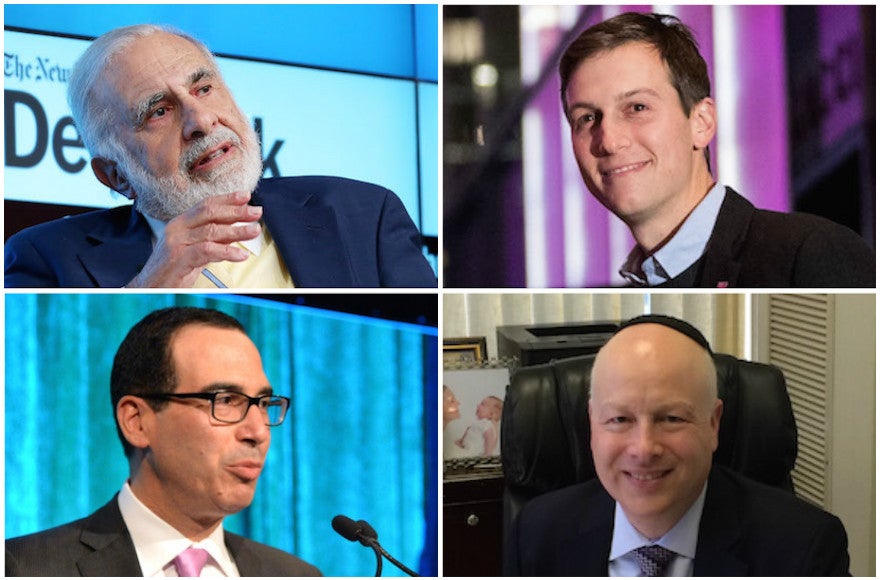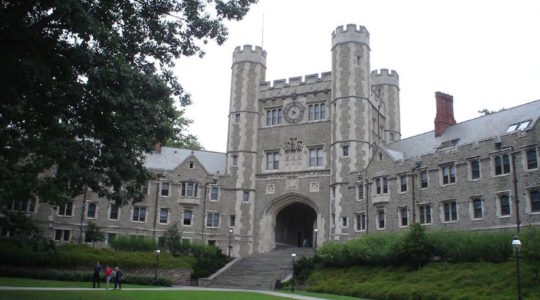(JTA) — American Jews are watching the beginning of Donald Trump’s presidency with both fear and hope.
Many have expressed worries about some of his supporters’ ties to the so-called “alt-right” movement, whose followers traffic variously in white nationalism, anti-immigration sentiment, anti-Semitism and a disdain for “political correctness.” Those fears intensified when Trump named as his chief strategist Stephen Bannon, the former chairman of Breitbart News, a site Bannon once referred to as a “platform” of the alt-right. Trump’s strongly conservative Cabinet picks also back policies on health care, the environment, abortion and civil rights often diametrically opposed to the views of most Jewish voters.
Yet others have praised Trump’s stance on Israel and his nomination of David Friedman, a bankruptcy lawyer who supports West Bank settlement construction and has expressed doubts about the two-state solution, as U.S. ambassador to Israel. Trump won 24 percent of the Jewish vote, with especially strong support in the Orthodox community.
Here is a look at the president’s Jewish advisers who will be helping to shape U.S. policy for the next four years.
Jared Kushner
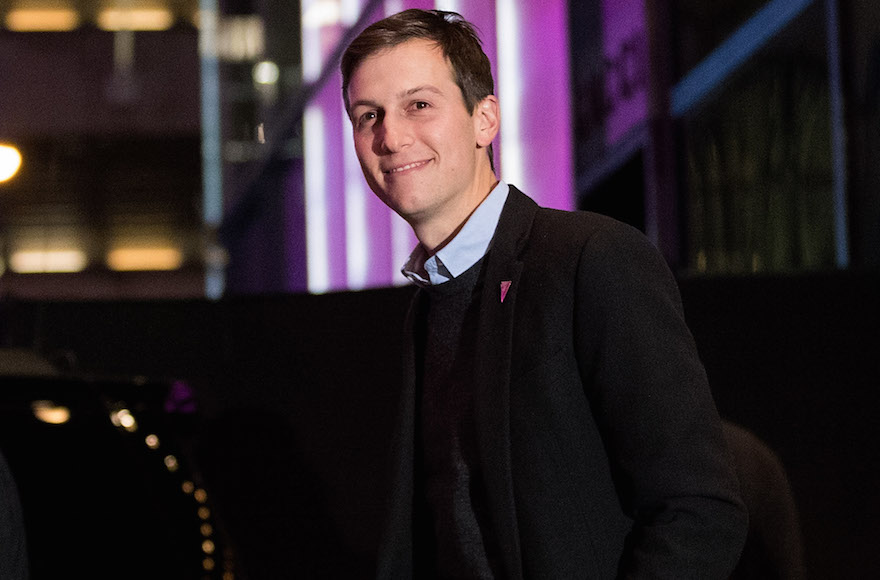
Jared Kushner exiting Trump Tower in New York City, Dec. 7, 2016. (Drew Angerer/Getty Images)
Trump’s Orthodox son-in law is serving as a senior adviser to the president. Kushner, the 36-year-old scion of a prominent real estate family from New Jersey, will not receive a salary and will focus on the Middle East and Israel as well as partnerships with the private sector and free trade, according to The New York Times. A day before his appointment was announced, Kushner said he would step down from his role as CEO of his family firm, Kushner Properties.
Kushner, who married Trump’s daughter Ivanka in 2009, played a crucial role in the president’s campaign, especially on Israel. He worked on Trump’s speech to the AIPAC annual policy conference that earned the real estate mogul a standing ovation, and helped plan a trip to Israel for his father-in-law last year. (Trump canceled the trip after Prime Minister Benjamin Netanyahu slammed his call to ban Muslim immigration to the United States.)
Trump appears to be smitten with Kushner, often referring to his “fantastic” son-in-law when boasting of his pro-Israel credentials.
Kushner may have become a household name during the campaign, but he’s no stranger to the limelight. In 2006, at 25, he bought the New York Observer newspaper. Two years later he became CEO of Kushner Properties, four years after his father was sent to jail for tax evasion, illegal campaign donations and witness tampering. In 2015, Fortune named Kushner to its 40 Under 40 list, an “annual ranking of the most influential young people in business.”
David Friedman
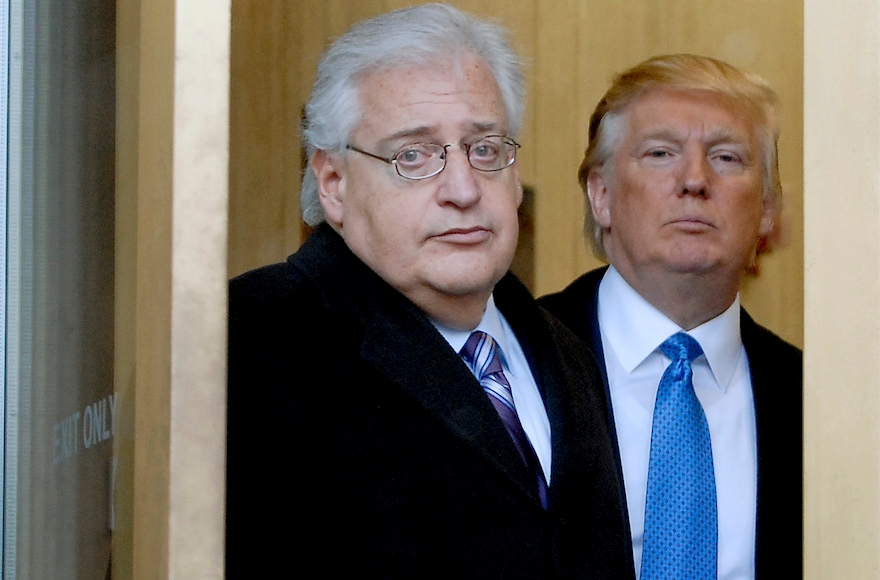
David Friedman, left, and Donald Trump exiting the Federal Building following their appearance in U.S. Bankruptcy Court in Camden, N.J., Feb. 25, 2010. (Bradley C Bower/Bloomberg News via Getty Images)
Friedman, a bankruptcy expert and longtime Trump attorney, was tapped as the U.S. ambassador to Israel. A statement by Trump’s transition team in December said Friedman, who speaks Hebrew, would serve from Jerusalem, but White House press secretary Sean Spicer said last week that Trump had yet to decide on moving the embassy from Tel Aviv.
Friedman, who is in his late 50s, is the son of a Conservative rabbi with a family history of ties to Republican presidential candidates — his family hosted Ronald Reagan for a Shabbat lunch in 1984, the year he won re-election. He lives in Woodmere, New York, in the largely Jewish area known as the Five Towns, and owns a home in Jerusalem’s Talbiya neighborhood, according to Haaretz.
Friedman has expressed support for and funded construction in Israeli settlements, and has expressed doubt about the future of the two-state solution, traditionally a pillar of bipartisan U.S. policy in the region.
Some of his controversial statements — including slamming backers of the liberal Israel advocacy group J Street as “far worse than kapos” and charging President Barack Obama with “blatant anti-Semitism” — have sparked outrage from liberal groups.
Jason Greenblatt
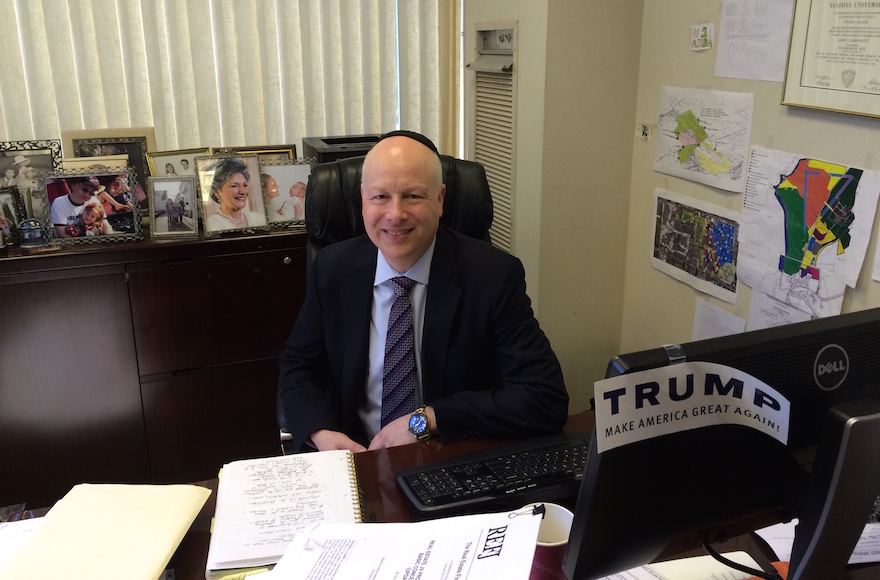
Jason Greenblatt is working as a special representative for international negotiations in the Trump White House. (Uriel Heilman)
Greenblatt, the longtime chief legal officer for the Trump Organization, is working as special representative for international negotiations focusing on the Israeli-Palestinian conflict, U.S.-Cuba relations and American trade agreements with other countries. An Orthodox Jew and Yeshiva University graduate, Greenblatt studied at a West Bank yeshiva in the mid-1980s and did armed guard duty there.
A father of six from Teaneck, New Jersey, Greenblatt said he speaks with people involved in the Israeli government but has not spoken to any Palestinians since his yeshiva studies. He has cited the American Israel Public Affairs Committee as one of his main sources for staying informed about the Jewish state, and helped draft Trump’s speech at the lobbying group’s annual conference in March.
Greenblatt, who has said he supports the two-state solution, has implied that Trump will take a laissez-faire approach to peace building.
“He is not going to impose any solution on Israel,” Greenblatt told Israel’s Army Radio in November. He also said that Trump “does not view Jewish settlements as an obstacle to peace.”
Steven Mnuchin
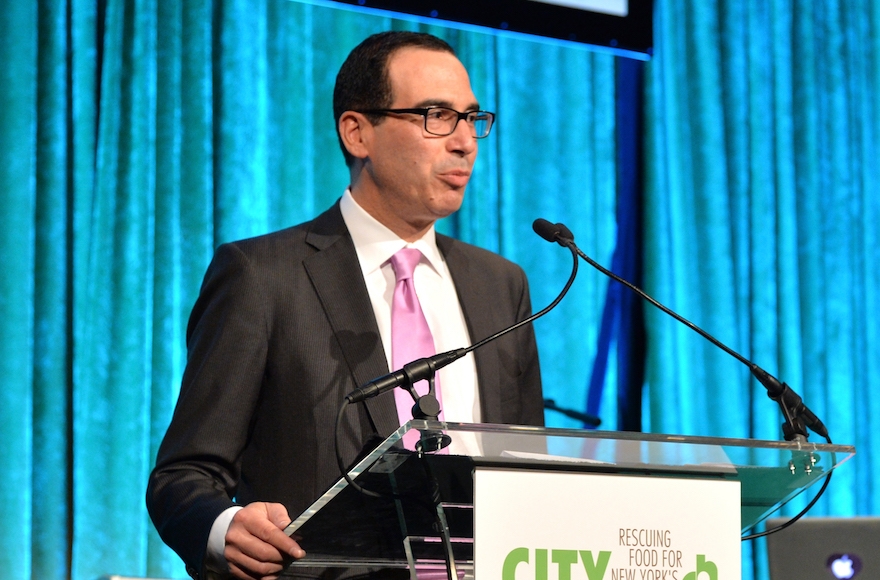
Steven Mnuchin speaking at City Harvest: An Event Of Practical Magic in New York City, April 24, 2014. (Andrew H. Walker/Getty Images for City Harvest)
Trump picked Mnuchin, a former Goldman Sachs executive who worked as Trump’s national finance chairman during the campaign, to serve as Treasury secretary.
Trump and Mnuchin have been friends for 15 years, and prior to being in charge of Trump’s campaign finances, Mnuchin, 54, served as an adviser. Part of what The New York Times describes as one of Manhattan’s “most influential families,” Mnuchin and his father — the prominent art dealer Robert Mnuchin — both became wealthy working at Goldman Sachs. The younger Mnuchin also co-founded the entertainment company RatPac-Dune Entertainment, which has worked on such Hollywood hits as “Avatar” and “Black Swan.”
Some saw Trump teaming up with Mnuchin as unusual, considering that the real-estate mogul had consistently bashed Goldman Sachs during his campaign — but it doesn’t seem to have hindered a good working relationship.
Stephen Miller
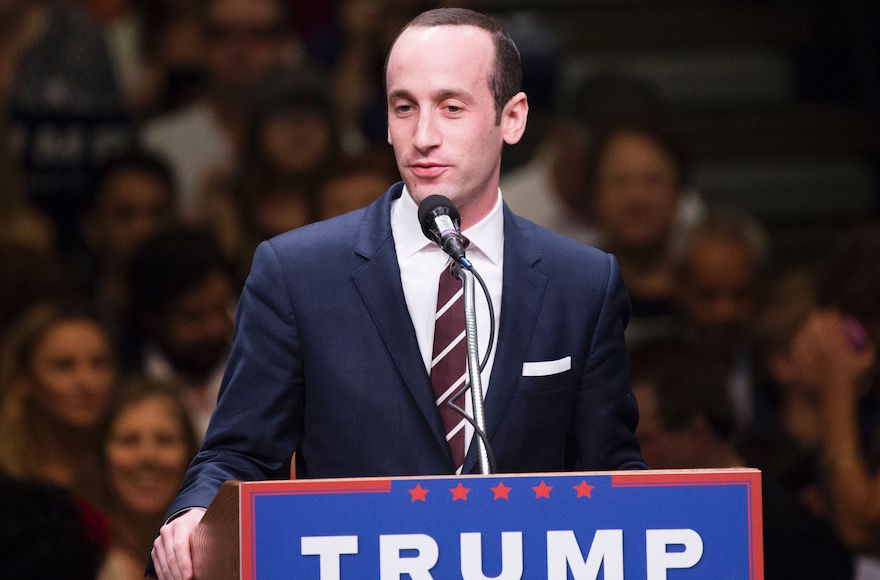
Stephen Miller speaking at a Donald Trump campaign rally in Anaheim, Calif. May 25, 2016. (Robyn Beck/AFP/Getty Images)
Trump named Miller, who has played a crucial role in his campaign by writing speeches and warming up crowds at rallies, as senior adviser for policy.
Miller, who has described himself as “a practicing Jew,” joined the Trump campaign in early 2016, quickly rising through the ranks to become “one of the most important people in the campaign,” as Trump’s campaign manager told The Wall Street Journal.
Previously the 31-year-old worked for seven years as an aide to Trump’s choice for attorney general, Sen. Jeff Sessions, R-Ala., helping the lawmaker draft materials to kill a bipartisan Senate immigration reform bill. Some of Sessions’ arguments are similar to the harsh and often controversial statements by Trump on the issue, such as calling for building a wall on the Mexican border and banning Muslim immigration to the U.S.
Though Miller grew up in a liberal Jewish home in Southern California, he was drawn to conservative causes early. As a high school student he wrote a letter to the editor of a local paper in which he slammed his school for providing free condoms to students and for making announcements both in English and Spanish, among other things.
Carl Icahn

Carl Icahn participating in a panel discussion at the 2015 DealBook Conference at the Whitney Museum of American Art in New York City, Nov. 3, 2015. (Neilson Barnard/Getty Images for New York Times)
Icahn, a businessman and investor, is serving as a special adviser on regulatory reform issues. He is working as a private citizen rather than a federal employee or special government employee.
An early supporter of Trump’s candidacy, Icahn, 80, is the founder of Icahn Enterprises, a diversified conglomerate based in New York City formerly known as American Real Estate Partners. He has also held substantial or controlling positions in numerous American companies over the years, including RJR Nabisco, Texaco, Philips Petroleum, Western Union, Gulf & Western, Viacom, Revlon, Time Warner, Motorola, Chesapeake Energy, Dell, Netflix, Apple and eBay.
Icahn is a major giver to Mount Sinai hospital in New York City, among other philanthropic endeavors. In 2012, he donated $200 million to the renamed Icahn School of Medicine there.
In addition, Icahn established seven Icahn Charter Schools in the Bronx borough of New York.
Gary Cohn
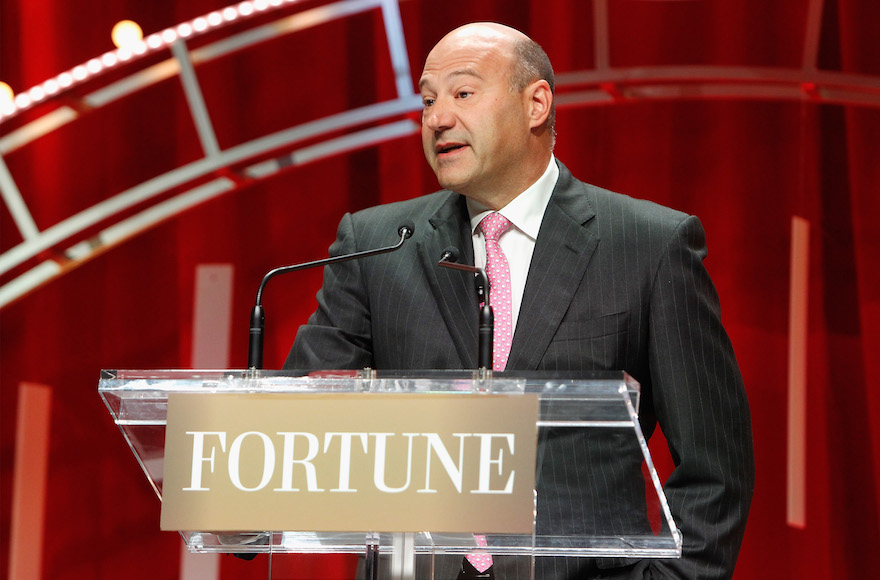
Gary Cohn speaking at Fortune’s Most Powerful Women Summit in Washington, D.C., Oct. 13, 2015. (Paul Morigi/Getty Images for Fortune/Time Inc)
Cohn, the outgoing president and chief operating officer at Goldman Sachs, heads the White House National Economic Council. At Goldman Sachs, where he had worked since 1990, Cohn answered to CEO Lloyd Blankfein and was considered a strong candidate to lead the bank.
The 56-year-old father of three has a reputation for abrasiveness, but also for getting things done, according to a Wall Street Journal profile last year. In a 2014 New York Times op-ed, Goldman Sachs executive Greg Smith wrote on the day he resigned that Blankfein and Cohn were responsible for a “decline in the firm’s moral fiber” that placed its interests above those of its clients.
Cohn, a Cleveland native, in 2009 funded the Cohn Jewish Student Center at Kent State University named for his parents.
Success wasn’t always obvious for Cohn, whose struggle with dyslexia made school difficult for him. But the Goldman Sachs banker, who was featured in a book on underdogs by writer Malcolm Gladwell, told the author that his learning disability also taught him how to deal with failure and that “I wouldn’t be where I am today without my dyslexia.”
Boris Epshteyn
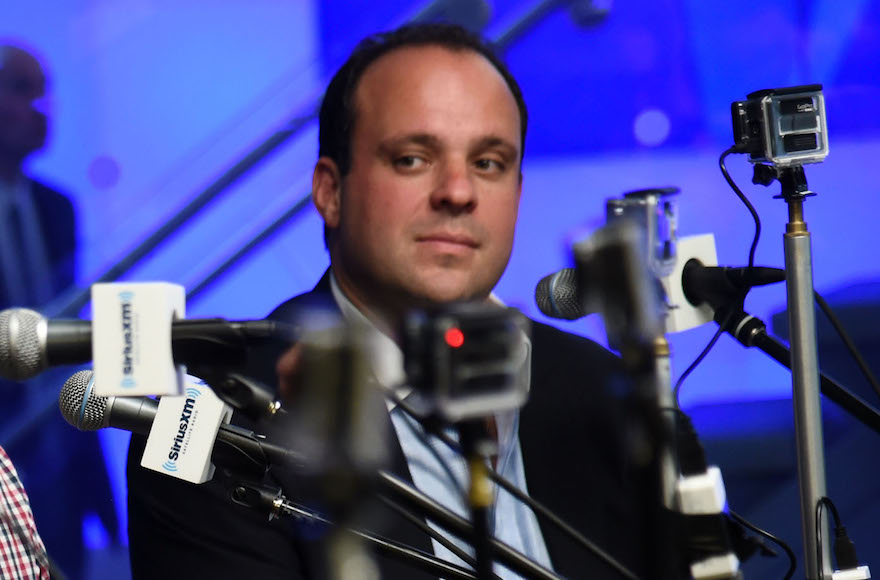
Boris Epshteyn attending SiriusXM’s “White in America” special at SiriusXM Studios in New York City, June 30, 2015. (Ilya S. Savenok/Getty Images for SiriusXM)
Epshteyn, a Republican political strategist who appeared as a Trump surrogate on TV, is working as a special assistant to the president. Epshteyn, who is in his mid-30s, also is serving as assistant communications director for surrogate operations.
A New York-based investment banker and finance attorney, Epshteyn was a communications aide for Sen. John McCain’s presidential campaign in 2008, focusing his efforts on the Arizona senator’s running mate, then-Alaska Gov. Sarah Palin.
He defended Trump on major TV networks over 100 times, according to The New York Times. TV hosts have described Epshteyn, who moved to the United States from his native Moscow in 1993, as “very combative” and “abrasive.”
In 2014, he was charged with misdemeanor assault after being involved in a bar tussle. The charge was dropped after Epshteyn agreed to undergo anger management training and perform community service.
David Shulkin
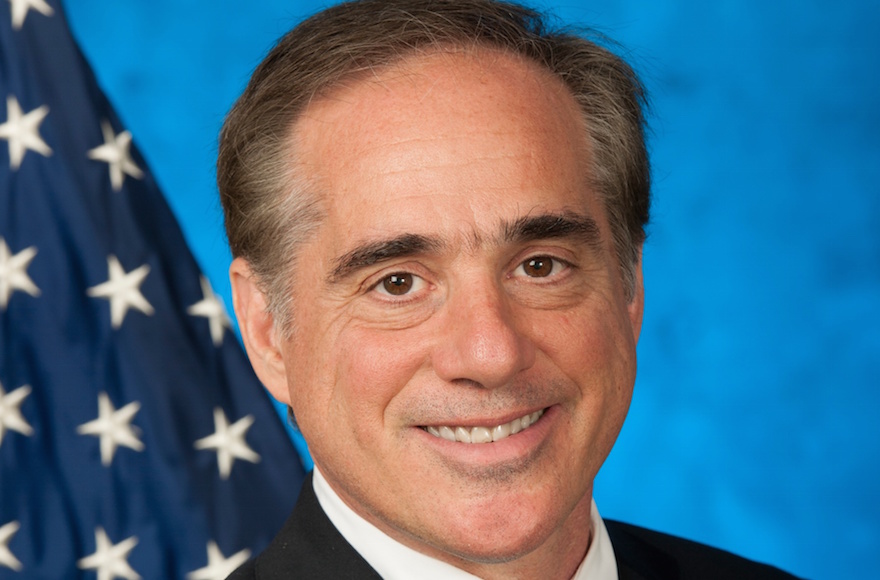
Dr. David Shulkin is the first Trump holdover appointment from the Obama administration. (Wikimedia Commons, public domain)
Dr. David Shulkin, the undersecretary for health at the Department of Veterans Affairs, will lead the department as secretary under Trump if confirmed by the Senate. He would be the first holdover appointment from the Obama administration, in which he served since 2015.
Shulkin, 57, is an internist who has had several chief executive roles, including as president of hospitals, notably Beth Israel Medical Center in New York City. He also has held numerous physician leadership roles, including as chief medical officer for the University of Pennsylvania Health System, and academic positions, including as chairman of medicine and vice dean at the Drexel University School of Medicine.
As an entrepreneur, Shulkin founded and served as the chairman and CEO of DoctorQuality, one of the first consumer-oriented sources of information for quality and safety in health care.
Reed Cordish
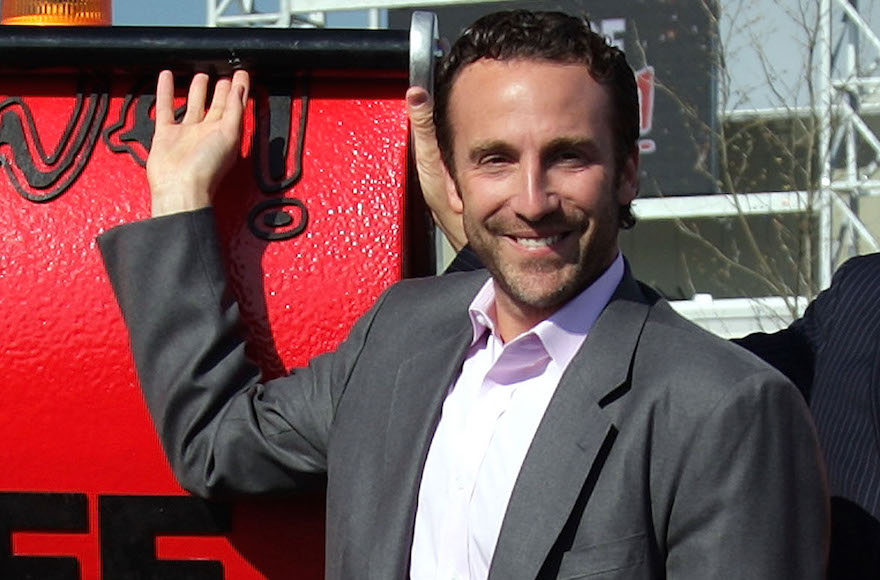
Reed Cordish attending the Celebration of Xfinity Live! Philadelphia, March 30, 2012. (Bill McCay/WireImage via Getty Images)
Trump chose Cordish, who is friends with his son-in-law Jared Kushner, to serve as assistant to the president for intragovernmental and technology initiatives. He will be responsible for initiatives requiring multi-agency collaboration and also focus on technological innovation and modernization.
Cordish is a partner at his family’s real estate and entertainment firm, the Baltimore-based Cordish Companies, .
Cordish’s father, David, the chairman and CEO of The Cordish Companies and an AIPAC board member, is a friend of Trump. The two met during the mediation process of a lawsuit in which Trump sued The Cordish Companies.
And Cordish, who is in his early 40s, has another connection to the Trump family — he was introduced to his now-wife Margaret by none other than Ivanka Trump, who attended the couple’s wedding in 2010 with husband Jared Kushner. Cordish and his wife were listed as co-hosts for a Manhattan fundraiser for Trump’s presidential campaign in October, Jewish Insider reported.
Avrahm Berkowitz
Berkowitz, 27, is serving as special assistant to Trump and assistant to Jared Kushner. Berkowitz and Kushner met on the basketball court of an Arizona hotel during a Passover program, Jewish Insider reported. The two stayed in touch and Berkowitz went on to work with Kushner in several capacities.
After graduating from Queens College, Berkowitz worked for Kushner Companies and later went on to write for Kushner’s paper, the New York Observer. In 2016 Berkowitz, who was then finishing up his last semester at Harvard Law School, directed a Facebook Live talk show for the Trump campaign. Later he worked on the presidential campaign as assistant director of data analytics.
Berkowitz’s first cousin is Howard Friedman, who served as AIPAC president in 2006-2010, according to Jewish Insider.
READ MORE:
Meet the Jews in Donald Trump’s inner circle
Stephen Bannon: 5 things Jews need to know about Trump’s chief strategist
Who is Jared Kushner, Donald Trump’s Jewish son-in-law?
JTA has documented Jewish history in real-time for over a century. Keep our journalism strong by joining us in supporting independent, award-winning reporting.
